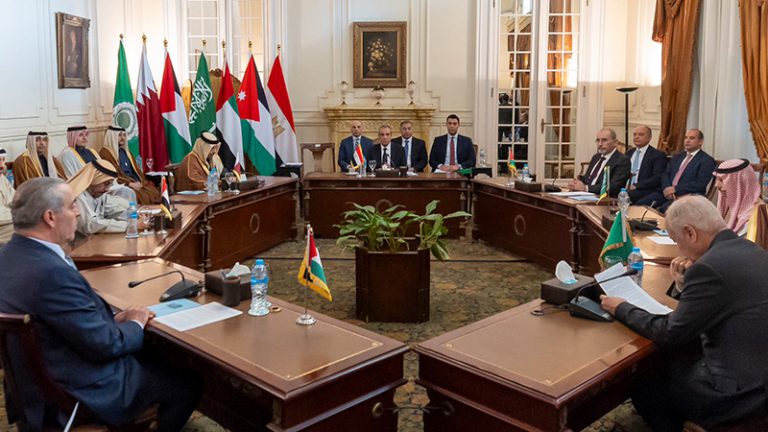
Four key political actors in the Middle East have recently made surprising moves that offered hints of how Arab states and non-state actors can collectively enjoy more impact and greater global respect by resisting American and Israeli colonial dictates and launching their own initiatives through a coordinated Arab effort. The four actors are Jordan, Hamas, Saudi Arabia, and Egypt—two of which are traditionally the two most powerful Arab countries in terms of their regional impact and global links. In recent weeks, acting in parallel and in unison, these four have responded to US-Israeli initiatives and demands by making moves that are unusual in the annals of modern Middle Eastern history.
In light of Israeli repeated violations of the ceasefire, Hamas refused to bow to a US-Israel demand to release three more Israeli hostages by February 15 or face new rounds of vicious attacks. Instead, it insisted that Israel must simultaneously fulfill its obligations under the January 2025 ceasefire if it wants Hamas to do its part and release the hostages as agreed. As a result, the crisis forced Netanyahu to reshuffle his team, accusing his security agencies, the Mossad and the Shin Bet, of making too many concessions to Hamas, thus hardening its position. Israel buckled and gave in, after which humanitarian aid flows into Gaza increased substantially, negotiations on the second phase of the ceasefire resumed, and Palestinians were able to move more freely within Gaza.
Hamas did not ask for any new concessions, only that Israel meet its obligations under the ceasefire it agreed to. Hamas’s ultimatum succeeded and the ceasefire steps were back on track because it demanded that it be treated seriously by Israel, and Israel had learned that only negotiations could free its hostages. Rarely have non-state actors in this region successfully faced down much stronger colonial predators in this manner. It is hard to know if such dynamics will continue. Perhaps Israel conceded simply as a short-term tactic to get its detained citizens back, after which it will resume its genocidal assault on Gaza’s lands and population, aided and abetted as it is by the United States, the United Kingdom, and others.
For their part, Egypt and Jordan were pressured by the United States to acquiesce to President Donald Trump’s wild proposal to accept some two million Palestinians who would be displaced from the Gaza Strip permanently, perhaps to make room for American investors to turn the enclave into what Trump called the “Riviera of the Middle East” and Israel’s colonial settlers. Both Egypt and Jordan, who are extremely vulnerable to Trump’s threat to cut US economic and military aid, resisted politely but vehemently rejected the proposal. More important, they consulted and planned to meet with the Palestinian Authority, Qatar, Saudi Arabia, and the United Arab Emirates to agree on a counter-proposal to reconstruct Gaza over five years without Hamas control or the expulsion of its Palestinian residents.
The Arab plan for Gaza, set to be released in March, is as striking as Hamas’s staring down Israel. Rarely in modern history have Arab leaders launched serious diplomatic initiatives that challenged prevailing western or Israeli positions. This is especially noteworthy in the current context of a devastated and suffering Gaza facing the ferocious American-supported Israeli military, Israel’s rampage and threats across the Arab region and Iran, and the severe fiscal and security vulnerabilities of Jordan, Egypt, and other Arab states that rely on US-Israeli cooperation for their stability.
Nevertheless, the joint Arab response to the US-Israeli desire to expel Palestinians from Gaza seems to be moving ahead, with an emergency summit meeting set for March 4 in Egypt. Looking at these developments, it is possible to see three rare Arab dimensions that should be monitored closely for signs of a revival of collective political and diplomatic action, efficacy, and self-respect.
The first is the ability to make a serious counter-proposal for rebuilding Gaza—without displacing its indigenous population—that goes beyond simply responding to and rejecting Israeli-American proposals for ethnic cleansing in a context of imperial brutality.
The second dimension is the concept of collective Arab action that could make the Gaza reconstruction plan feasible and that would coalesce around protecting the vulnerable Palestinians there. Such a plan would also include close coordination with other countries around the world that have rejected the ethnic cleansing of Palestinians.
The third and perhaps the most important dimension is Saudi Arabia’s adoption of a dynamic position that at once rejects the Trump plan and leads the Arab response. Saudi Arabia today is the most powerful Arab country, with potentially the greatest political and economic influence globally due to its energy assets, financial power, Islamic religious leadership, and strategic location. But in the last half century or so it often shunned asserting its leadership beyond its neighborhood, perhaps with the exception of leading the Arab oil embargo against the United States and the West during the 1973 Arab-Israeli war and joining the G20 group of nations in 2008. Regionally, Saudi Arabia led the Arab world in proposing the 2002 Arab Peace Initiative for peace with Israel. At the same time, it pursued unwarranted initiatives that achieved few lasting rewards or brought international criticism, such as entering into and inflaming Yemen’s civil war that began in 2014 and helping in the 2017-2021 blockade of Qatar.
Saudi Arabia arguably now plays a more constructive role in the Middle East and the world, including by diversifying its strategic links with regional and global powers. Hosting the US-Russian diplomatic talks on the Ukraine war on February 18 is one example, as is the kingdom’s speedy revival of links with the new Syrian government. How well the kingdom manages a new coalition of Arabs and others to rebuild Gaza will be a huge test of its ability to lead the Arab states in launching important initiatives, which start in Palestine but necessarily involve wider issues. Such a development requires deep political coordination with others to succeed, rather than the unilateral actions that most Arab states have favored in recent years.
To be sure, a pan-Arab and internationally supported Gaza reconstruction initiative runs the risk of merely recreating a situation in which Gaza is rebuilt only to see Israel attack it again five or more years down the road if it does not like how the Strip is governed. The answer to that fair concern is that a successful Gaza initiative now can only be attempted if it includes longer horizons that remove the fear and causes of future Palestinian-Israeli wars.
If the recent novel moves, and others likely to follow soon, are to catalyze serious Arab political initiatives, these would have to be designed to have an impact far beyond Gaza, Palestine, and Israel. A Saudi-anchored, Arab-led international effort to rebuild Gaza and see it governed by Palestinians should open new doors to important advances ahead. Three big ones come to mind.
The first such advance would be to relaunch and seriously advocate globally for the 2002 Arab Peace Initiative that would allow Palestinians, Israelis, and others in the region to enjoy the equal security, peace, legitimacy, and prosperity that they all deserve.
The second would be to work for a region-wide security and development framework that includes the Arab states, the Palestinians, Israel, Iran, Turkey, and the Kurds.
The third advance would be to spur intra-Arab economic trade and cooperation in order to reverse the debilitating trend of mass Arab pauperization, and allow all Arab societies to share in the wealth that would come from integrating their oil, gas, water, human, cultural, agricultural, and technological resources. Several UN agencies have done pioneering work on this, which could allow credible regional economic integration initiatives to be launched.
These lofty goals can only be achieved when local and global forces that have shattered the Arab region during the past century are tamed once and for all. Western imperial and colonial interference in the Middle East is one such force; another is unchecked militant Zionism that has become a runaway killing machine in many parts of the region. More effective and inclusive Arab governance is also needed, which must emerge from societies that conclude this is in their best interest.
The recent moves by Hamas, Jordan, Egypt, Qatar, and Saudi Arabia, with other Arab states working quietly behind the scenes, point to how the Arab world can start to move in the direction of collective action. To achieve deserved positive outcomes, there is a need to apply more of what Hamas, Saudi Arabia, Egypt, and Jordan indicated is within their power. This comprises self-confidence, political assertion, collective action, a focus on equal justice for all, and bold initiatives that end a miserable century of vulnerability, dependency, and tutelage to western and Zionist imperial designs.
The views expressed in this publication are the author’s own and do not necessarily reflect the position of Arab Center Washington DC, its staff, or its Board of Directors.
Featured image credit: SPA

